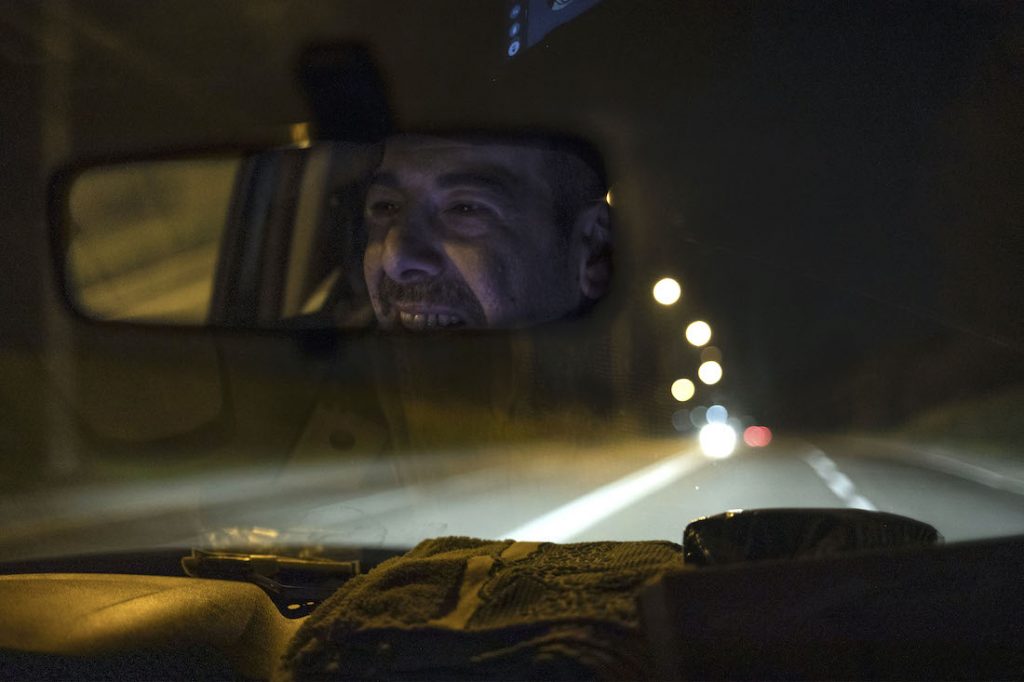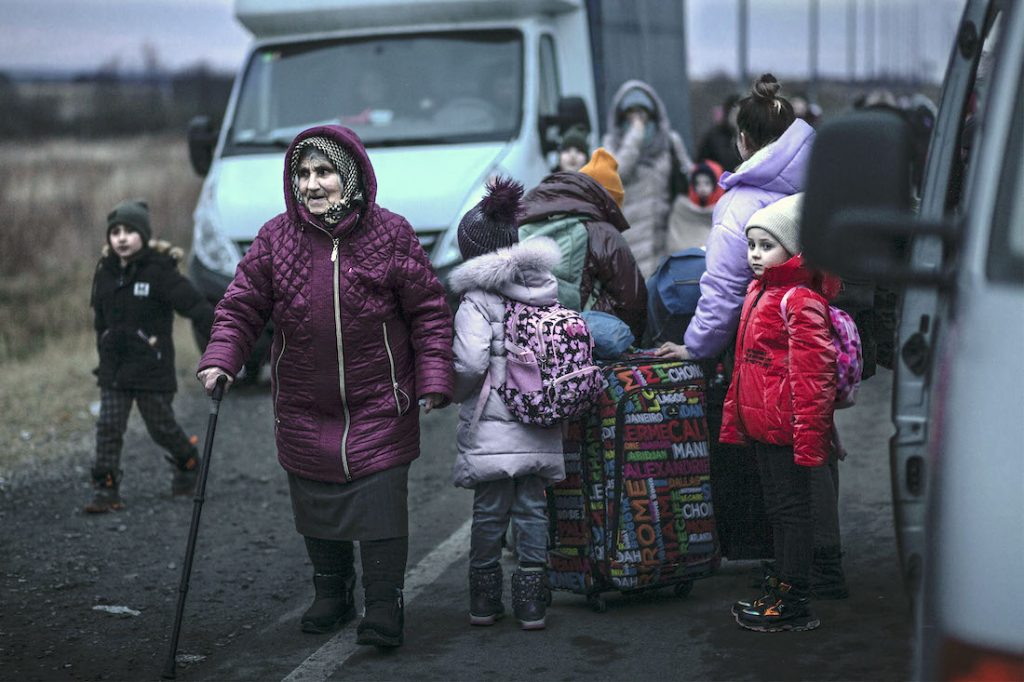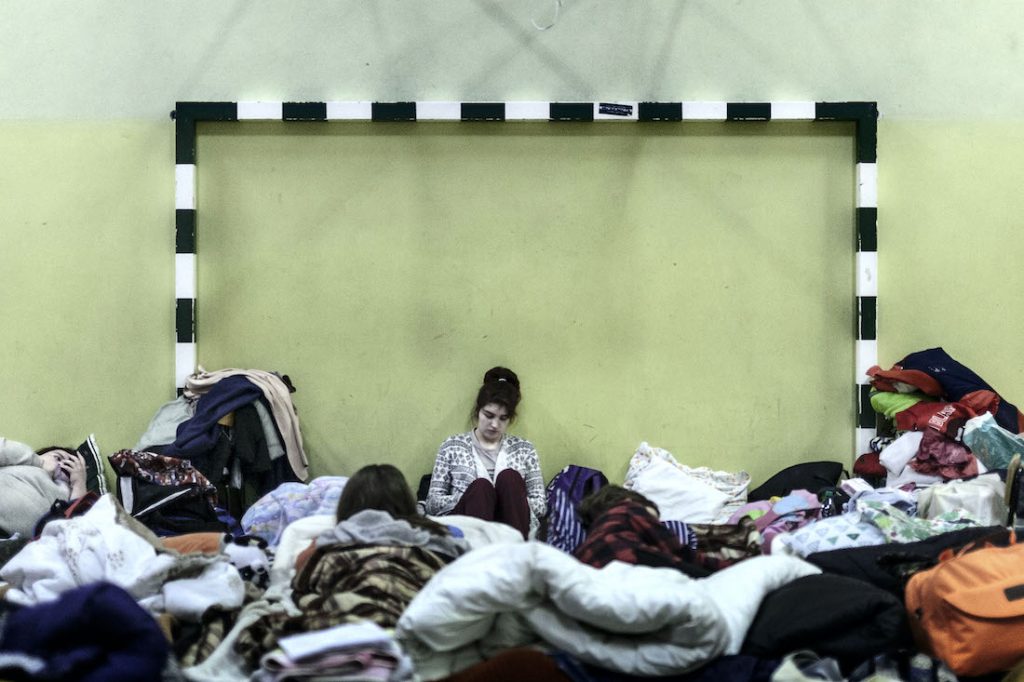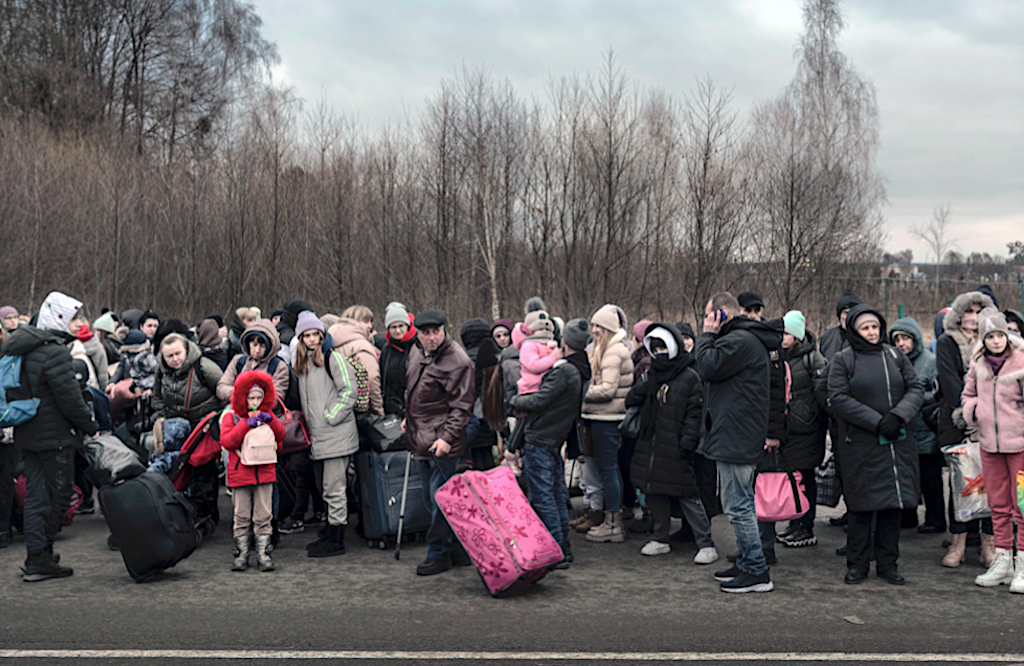Father Duncan paces back and forth in the parking lot of a hotel located 100 kilometres from the border between Poland and Ukraine. “Please tell me you’re not smoking”, his wife Cindy just texted him. It’s 10.30 PM and cars are still occasionally stopping in front of the building. He left London almost as soon as the war broke out, and will be flying back home in a couple days. He needs to rest, but he is already planning to come back in two weeks. Even though he has not travelled to the frontline, the situation is still taking a heavy toll on him.
“I don’t usually buy cigarettes, but she knows I do this when I am stressed,” Father Duncan says. He is familiar with the region, having travelled here for over 30 years to preach the Gospel. But he has never seen anything like this. Like countless others from all over Europe, he has travelled to the fringes of the conflict to bring women and children to safety.
So far, the Russian invasion of Ukraine has displaced nearly three million people as we write, and most of them have found at least temporary refuge in Poland – where the national government claims to have taken some 1.5 million of them. UN High Commissioner for Refugees Filippo Grandi dubbed it “the fastest growing refugee crisis in Europe since World War II.” But as Vladimir Putin’s army continues to advance, and to shell western Ukraine, this could yet become the worst refugee crisis in Europe’s history.
International organisations, including the United Nations, are notably absent along the border. As a result, a significant portion of relief operations are shouldered by individuals who have flocked to the Ukrainian border. They were horrified by what they had seen on TV, and frustrated by their government’s slow response.
One of them was Massi, a 42-year-old tobacconist who lives in Perugia, in central Italy. He decided to embark on a 1,600-kilometre journey to Przemyśl, the first train station on EU territory for those fleeing Ukraine through Poland. Massi travelled through Bologna and Trento (in the north of Italy), picking up humanitarian aid along the way. “The important question to ask right now, is why shouldn’t we do this?” Massi says.
Wedged between the boxes chock-full of medicines, diapers, and canned foods, he stops in Katowice, a Polish city of over 2 million inhabitants near the border with Czech Republic. He had heard that there were plenty of collection points along the border, and so decided to unload everything here. Similar points have popped up almost everywhere in the country.

As he unloads the car, elderly women step into the room to collect warm clothes. Then a group of younger women speaking Ukrainian drops in. They walk away with as many boxes of pasta as they can carry. Outside, an 82 year-old man zig-zags around, looking for his family.
Massi needs to make room in his car for the people he wants to bring back to Italy. Namely, Maryana and Ivana, with their sons – Oleg and Vladislaw, aged 2 and 5. Maryana’s mother lives in a small town lodged in the Umbrian hills, some 40 kilometres from Perugia. When Maryana heard that Massi was travelling to the border she contacted him to arrange a lift back to Italy in his car.
The two women had enough money to pay for a hotel room, and waited for Massi in the lobby. Others, however, cannot afford the same luxury. They resort to camping inside – and outside – the Przemyśl train station, as they wait to hear from friends, relatives, and volunteers, and to figure out where their journey will take them next.

“In the last two weeks, roughly 500,000 refugees have passed through our town,” says Wojciech Bakun, mayor of Przemyśl, a town of 60,000 residents. It is a peculiar situation for a man affiliated with a political movement – Kukiz 15 – that in the past wanted to build a wall along the border with Ukraine. “I don’t want to build a wall just with Ukraine,” Bakun says, “I need to think about the physical safety of the border.”
It’s not the first time that Poland's eastern border has been the epicentre of a humanitarian crisis. In November 2021 several thousand refugees – mostly from Iraq, Syria, and Afghanistan - were stranded along the border with Belarus. Polish authorities accused President Aleksandr Lukashenka of orchestrating the arrival of migrants from the Middle East, misleading them into thinking that they would be allowed entry into EU countries.
The amount of people trying to cross the border was a lot smaller than it is right now, but politically the issue seemed much bigger. “That situation was completely different. Now we have to cope with a neighbouring country affected by war, Ukraine. Back then Belarus was not at war,” says Bakun. “The entire situation was organised by Minsk. People cannot simply cross our borders without the right documents.”
Recently, the mayor of Przemyśl made international news after he reprimanded former Italian interior minister Matteo Salvini during a press conference. In front of the cameras, at the train station, Bakun showed a Putin T-shirt that the leader of Italy’s Lega party once notoriously wore. Although the Lega’s and Kukiz 15’s positions on refugees, abortion, and LGBT rights are remarkably similar, their stances on Russia are different, to say the least. “We all need to be on the same page when it comes to this war. It didn’t start two weeks ago, it started in 2014. Since then many leaders – not just Salvini – have continued to support Putin,” Bakun laments.

Hrushiv, Ukraine. An elderly lady getting in line to register herself with Ukrainian border guards. | Photo: © Giovanni Culmone
While political diatribes continue to run their course, volunteers who have flocked from all around the world – the mayor estimates them to be around 1,200 – are trying to ease the difficult situation for arriving refugees. There are stands handing out free Polish SIM cards, blankets, and meals of all kinds. Individuals are offering rides across the continent, on cars and buses. But the train station in Przemyśl is only one of several border crossings – and it is in fact one of the better served.
In particular, the situation on the Ukrainian side of the border crossings is proving to be more problematic. Scrupulous checks and widespread suspicion by border guards often result in fewer supplies being delivered.
On the Ukrainian side of the Budomierz border crossing, in Hrushiv, there is a line of buses that runs for kilometres. Women and children fleeing the war must register with local authorities in order to receive the paperwork they need if they wish to be granted refugee status in the EU. Inevitably, these bureaucratic procedures create bottlenecks at the border crossings. Thousands of people are forced to sleep in their cars or on the buses – though they can’t keep the heating on, because gas, like many products, has been rationed.
Until a few days ago, there was a solitary man standing by the side of the road with a pot welded to a rusty barbecue, handing out hot water to people waiting in line. But even then, people were reluctant to lose their place, preferring to endure freezing temperatures without the prospect of a hot drink.
Volunteers like Marcin, who organises a folk festival nearby, are trying to provide some measure of relief. He set up three heated tents, a small kitchen, and a few beds to provide shelter to women with newborn babies.

Not everyone, however, manages to find a way into Ukraine. Kai and Leon drove all the way from London with a van filled with sleeping bags, blankets, and powdered milk. They even had a GoFundMe page where they received donations to purchase aid supplies. But the van they drove was not registered in their name, and the Ukrainian authorities barred them from entering. “I didn’t think these kinds of details would be important in war”, says Kai. “We just wanted to help and reach people in need. To bring them to safety.”
Among the people travelling in the opposite direction to the refugees - from Poland into Ukraine – are those looking to join combat operations. Lieutenant Colonel Hunter “Rip” Rawlings is a Marine Corps officer with 23 years of service under his belt. Together with his wife Erin – an endocrine surgeon – he was meant to be going on an Eighties nostalgia cruise in the Caribbean. Instead, they decided to travel to Poland and attempt to cross the border into Ukraine.
“I am a veteran, and I can spot another one from a mile away,” the lieutenant says. “There were U.S. veterans on the plane with me, but they wouldn’t speak on the record because they don’t want the press attention that comes with it. They are people with former combat experience and they want to go fight.”
At least two sources can confirm that an entire platoon of foreign fighters arriving from the United Kingdom passed through the border crossing in Hrebenne early in the morning of 10 March. “I normally wouldn’t report this kind of stuff, but they did it in broad daylight,” Rawlings says.
‘The International Red Cross is not here, and neither are the large organisations. I don’t know if it’s because people are not buying into it yet, or what.‘ – Doctor Erin Felger
Incidentally, on the same day, children who were evacuated from the oncology ward of Lviv’s hospital also crossed the border in Hrebenne. Together with their mothers, they will be distributed around specialised structures in Poland and other European countries in order to receive medical treatment.
There is a small hospital tent in Hrebenne, but it is far from adequate to accommodate the needs of these kinds of patients. Here, Doctor Erin Felger – Rawlings’s wife – can only try to give basic treatment to refugees passing through, or redirect them toward specialised help if it’s needed. “There were at least 50 or 60 of these children from Lviv that passed through Hrebenne. They are all immunocompromised and they have no way to fight off infections because of the cancer treatment they are receiving.” A crowded refugee camp, particularly during the pandemic, could prove fatal for them.
“We’re all on our own,” Dr Felger says. “The International Red Cross is not here, and neither are the large organisations. I don’t know if it’s because people are not buying into it yet, or what.”

In addition to the visible injuries inflicted by war, there are also invisible wounds caused by the conflict and the exodus that follows. It is not uncommon to see children between the ages of 2 and 5 already showing symptoms of depression. “Mental health is a problem among the children,” Dr Felger says. “They won’t talk. They just turn their heads away. That’s very unusual in a child, they would typically be very welcoming at that age. They haven’t normally set up those barriers yet.”
Their mothers have little mental space to think about anything. The worst affected walk around in a haze. “They will be the ones who develop PTSD” says Dr Felger. Sadly, there are not a lot of people along the border who are trained to provide help for that. “Children are going to have a hard road in front of them until they receive specialised support,” she says.
As war continues to rage and large international NGOs struggle to bring much-needed humanitarian support to the field, the fate of such people remains largely in the hands of good-hearted volunteers from across the world.

With the support of the Evens Foundation
Was this article useful? If so we are delighted!
It is freely available because we believe that the right to free and independent information is essential for democracy. But this right is not guaranteed forever, and independence comes at a cost. We need your support in order to continue publishing independent, multilingual news for all Europeans.
Discover our subscription offers and their exclusive benefits and become a member of our community now!












